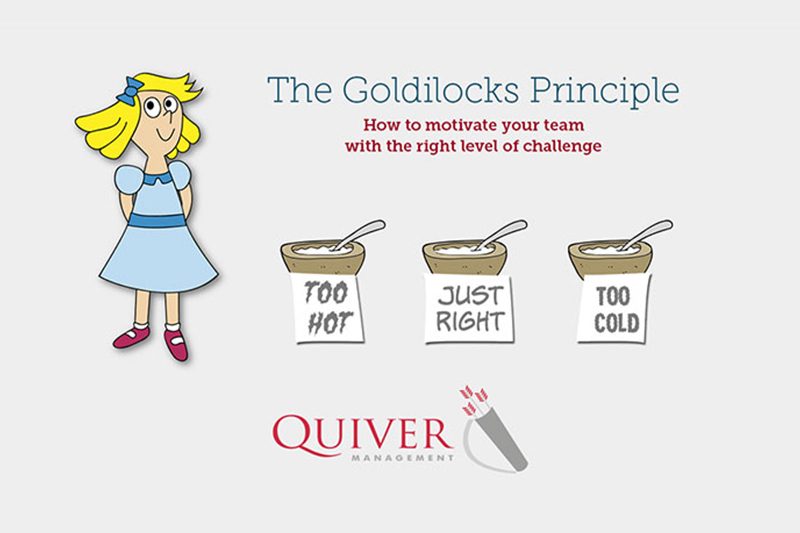Coaching for optimum performance – how to motivate your team with the just the right level of challenge
This article is available as a vlog via our Youtube channel. To view, please click here.
When you are coaching a team member, colleague or client and helping them set goals, what is the optimal level of challenge? When will a goal be motivating? Can a goal challenge be too big? Can it be too small? A good rule of thumb is to keep in mind is The Goldilocks Principle.
As human beings we love challenges. But, if a task is significantly below our current abilities it will be boring. But on the other hand, if the task is perceived as significantly beyond our current abilities it can be intimidating and discouraging.
To be highly motivating, tasks need to be right on that border between success and failure. We love to master a skill just beyond our current horizon or current capabilities.
We can call this phenomenon The Goldilocks Principle. You may remember the fairy tale, where Goldilocks enters the bear family’s house and tries the three bowls of porridge, one was too hot, one too cold while the third was just right and she was happy.
The Goldilocks Principle in the same way states that humans experience peak motivation when working on tasks that are right on the edge of their current abilities. Not too hard. Not too easy. Just right.
If we are working on challenges of optimal difficulty, then we will not only be motivated but also experience a boost in happiness and sense of achievement.
As leaders and coaches, we are aiming to help our team members and coachees develop and grow, build new capabilities and become more resourceful. The level of challenge in the goal and the journey towards the goal should stretch the coachee while they learn and grow.
So what type of coaching questions could be helpful when you are exploring goals with your coachee:
- You could simply ask: How motivated are you to reach this goal?
This will give you an immediate sense of the coachee’s perception of the level of challenge as well as how important it is to them. - To narrow it a bit further you could ask: How confident, on a scale of 1 to 10, are you that you can achieve your goal?
If their answer is 10 out of 10, maybe it is too easy? For me a 10 out of 10 is a “red flag”. Why are we discussing this, if it is so easy? What has stopped them doing this already?
If their answer is 1 or 2 out of 10, maybe the goal is too big and intimidating to be motivating?
A good tip here: If it appears to be too big a goal, consider breaking the goal into smaller but increasing challenges, which seem more manageable, while still stretching. As the coachee starts to achieve the initial milestones, they build confidence and you can encourage them to step up the pace, making the next sub-goal a bigger stretch than the previous one, to maintain motivation – as per The Goldilocks Principle. - And a third question, you could ask: Once you have achieved this goal, what will you have learned? Or what new capabilities will you have?
This encourages them to also recognise their increased capabilities, which they might be able to apply elsewhere.
Another aspect to consider to help maintain motivation and peak performance over an extended period, is how to ensure a sense of progress and reinforce success. Not only do we need to work on challenges at the right degree of difficulty, but we also need to get regular, and ideally immediate, feedback on our performance, evidence that we are succeeding and getting closer to our goal. This encourages us to keep going.
So, in summary: If we want to help ourselves and others to stay motivated for the long-term, we could simply say:
- Remember The Goldilocks Principle and work on stretching tasks of just manageable difficulty.
- Put measures of progress in place with regular feedback.
Coaching for leadership
Understanding how to motivate people is a fascinating subject and an essential skill for leaders and coaches. We cover and practise the use of The Goldilocks Principle and other motivational insights and tools in our coaching and leadership courses.
You may also enjoy reading our blog about the Pygmalion effect and the power of your belief in your team member’s abilities.
Please look at our website www.quivermanagement.com for more ideas and insights from our team of coaches, trainers and consultants.
Back to News & Blogs Overview
